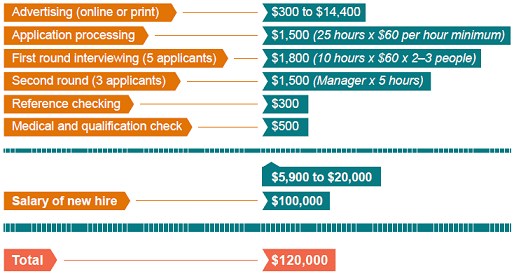Assessment: Why psychometric assessment beats gut instinct every time

In ten years of professional recruitment I have averaged about 500 job interviews a year, or 5,000 in total. So you might think I’d be the first person to say that the gut instinct a recruiter develops is more powerful than psychometric assessment. You’d be wrong.
Despite the fact that I interview people for a living (you could call me a professional interviewer), I rarely leave a recruitment process or the acquisition of talent to my gut instinct alone.
Doing so, regardless of my experience, simply gives a client a lower chance of creating a successful outcome. And a successful outcome here is one where a candidate remains in a role for longer than 30 months (typically the amount of time where return of investment is achieved).
Consider for a moment the recruitment process and the numbers associated with it. External or internal, these might roughly translate to the following for a $100,000 position:
To hire a new starter on $100,000 you are looking at an investment of almost $120,000, conservatively, and this doesn’t include the costs associated with onboarding, training, employee set-up etc.
As decision makers in a business, would you ever have the authority to purchase $120,000 of critical equipment off eBay without inspecting it or making sure it works? Most likely not. Why then do businesses commit to this type of spend on people without reducing the risk of it going wrong? Why do they insist on using gut instinct to make a $120,000 decision? Why is it accepted as common practice that close enough is okay?
Perhaps because they don’t know how simple and available the remedy is.
The best predictor of future job performance is not an interview conducted by a person who rarely conducts interviews. Nor is it an interview conducted by a person who has done 5,000 interviews. And it certainly doesn’t come from reviewing a resume or CV alone.
No, the strongest and most likely predictor of future job performance is a combination of behavioural interviewing, psychometric assessment, role play scenarios and reference checking. Anything less is the equivalent of ordering your next employee online.
This has been widely studied and Hudson’s own research paints a startling story. Our data shows that technical skills and experience are in fact the lowest indicators of a candidate’s potential future performance, while motivational drivers are the greatest predictors of success.
Our data shows that the number of years a person has studied, what their interests are or how many years experience they have – the kind of things that can relate to gut instinct decisions – are the least likely recruitment methods to predict a person’s success on the job. At the other end of the scale however is behavioural interviews, work sample tests and cognitive tests, all of which are by far the best proven methods for predicting a person’s success on the job.
Gut instinct is good. Interview experience is great. But hard scientific data such as psychometric testing on how a person thinks, acts and learns? That’s priceless.
Browse some of Hudson’s sample assessment centre questions.
Related insights
Event: Wow
Hudson recently decentralised its activity to better serve each employer’s requirements - with one objective in mind: get the job to be done.
Wed 01 Feb, 12am
Hiring: Managing workplace culture in the time of COVID-19
Culture and engagement are critical factors in driving organisational performance, and yet they have had to be re-invented during the COVID-19 disruptions. The hip office, workplace drinks, onsite gym and days off for birthdays, plus the casual banter around the water cooler: these are all aspects of work which go into creating a cohesive and…


